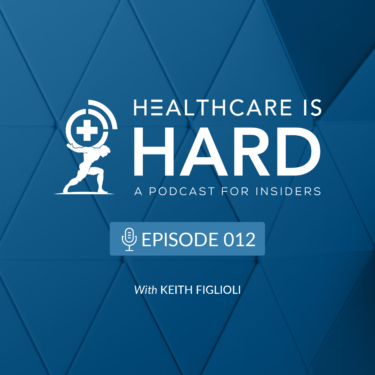The Healthcare is Hard podcast exists for a single purpose – to help listeners get inside the minds of people who understand the complexities of the health system best, and are pushing it towards change and innovation. In the past year, guests have included 5 current or former CEOs of major health systems, 2 current or former CFOs and leaders of organizations like The Health Management Academy, The Institute for Healthcare Improvement, and Premier, Inc. that are working deep inside the industry to drive change and innovation.
In these far-reaching discussion with industry leaders, there were three recurring topics that stood out the most: the shift to value-based care, a growing focus on social determinants of health, and the impact of new entrants into the market.
Here are a few of the highlights from the first twelve months of Healthcare is Hard that we’ve cultivated for this look back. To hear more insightful comments like this and Keith Figlioli’s takeaway’s from his many conversations, listen to the one year anniversary episode of Healthcare is Hard: A Podcast for Insiders.
“Since I started out as a practicing clinician that spent 24 years taking care of patients, a huge amount of my definition of value is outcome for the patients over the amount of aggravation that those patients and their families actually have to endure. And throughout my career, my definition of value is based on achieving the highest possible and best possible outcome and decreasing the amount of aggravation for the patient and the patient’s family. Believe it or not, quite often, that definition of value is quite consistent with decreasing costs as well.”
-Glenn Steele, former President & CEO of Geisinger Health System
“As I was practicing medicine over the years before Katrina, I kept running into the same challenge, which was that I could practice medicine really well, but there were lots of other things my patients needed that I couldn’t do. Especially the ones – which was most of them – that were uninsured, low income. They needed help with transportation or understanding what to eat, or being able to find healthy food. They had a lot of social situations that were really complicated. So, a great deal of the time when I was practicing medicine in the hospital or in the clinic, I was also trying to do social work and other things. When Katrina happened in 2005, it was this really interesting moment when a catastrophe opened some doors for us to create a healthcare system that would allow us to not only practice great medicine but address the non-medical drivers of health.”
-Karen DeSalvo, Chief Health Officer, Google
“I don’t think for a second we can do this on our own. Nor do I think for a second that competition will go away on niche pieces in the downline that we’re trying to help manage. What’s most important to me is that we find the right partners in the right places so that a life can be managed the way that person wants it to be managed so they bring continuity of care to themselves and a rationalized process for them and their family. And if we can have a partner do that and we win and they win in that transaction, that’s fantastic.”
-Terry Shaw, President & CEO, Advent He
